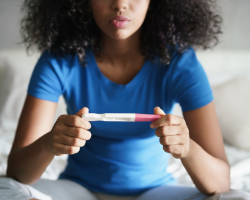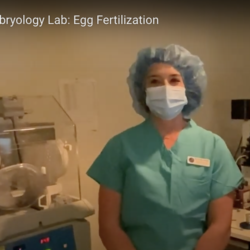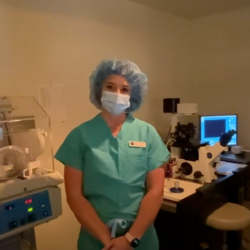
For patients who have chosen to undergo in vitro fertilization (IVF) treatment, it is hard not to get excited about the prospect of finally achieving pregnancy. Of course, you’ll be excited! However, this is a multi-step process that does take time and will require a little patience. IVF is a guided reproductive treatment that assists your body through the multiple stages of conception. Leading right up to testing for pregnancy, there is a certain process we follow to give you the best chance of a successful pregnancy. If you’re undergoing fertility treatments, here’s what you should know about pregnancy testing after IVF, how to do it, and early IVF pregnancy symptoms. To schedule an appointment with one of your fertility specialists click here.
When can I take a pregnancy test after IVF?
It is highly common for our patients to complete the embryo transfer stage of IVF treatment and immediately ask, “When can I take a pregnancy test?”
We understand. You’re in the midst of an often long and emotionally-taxing journey towards conception. For many, transfer feels like the moment when things “click.”
However, when it comes to how quickly you can take a pregnancy test after IVF, the answer is usually seven days after embryo transfer. Don’t stock up at the drugstore quite yet, though. You’ll test for pregnancy by a different method than an at-home pregnancy test, as we’ll discuss below.
IVF and the prospect of pregnancy is very exciting, so we understand that you’re anxious to get IVF pregnancy test results. By following the advice of the doctors at The Fertility Institute, you can ensure that you get accurate results for your pregnancy as early as possible.
How accurate are home pregnancy tests after IVF?
Unfortunately, your standard at-home pregnancy tests that you buy at a drugstore are not very accurate as an IVF pregnancy test. Too often, they’ll show false positives or false negatives, especially if the test is done too early. Here’s why.
Throughout IVF treatment, you’ll be taking fertility medications and hormones to help your body conceive. Right before egg retrieval, your fertility specialist will inject a large boost of hormones. Combined, these fertility drugs will increase the presence of the hCG hormone in your body.
The human chorionic gonadotropin (or hCG) hormone is known as the pregnancy hormone because it is produced by the body when pregnant. At-home pregnancy tests specifically look for the presence of hCG in the urine to determine if a person is pregnant.
Because the pregnancy test simply reads the level of hCG that’s already in your body due to fertility treatments, an at-home pregnancy test that is performed too early may lead to false positive results. Similarly, an early pregnancy test may produce a false negative result if your hCG hormones have not yet increased to levels detectable by an at-home pregnancy test.
You can avoid some of these at-home false positives or negatives by waiting for the 7-day period of time following your embryo transfer. This is how long most clinics recommend that patients wait before testing. At the Fertility Institute, we recommend that all of our patients simply avoid at-home pregnancy tests. Even with the wait, these pregnancy tests are simply too unreliable for IVF patients, with potentially-high emotional costs with a false positive or negative. Instead, we always suggest in-clinic IVF pregnancy tests for our patients.
How to test for pregnancy during IVF
Going through IVF is a process—emotionally, physically, and financially. If you’re undergoing this type of fertility treatment, you deserve an answer you can trust when it comes to your pregnancy.
The only reliable IVF pregnancy test is a test done in your fertility clinic by your doctors.
At The Fertility Institute, our team creates a testing schedule you can trust based on your IVF progress. Roughly seven days after the date of your embryo transfer, our doctors will schedule a beta pregnancy test. This is a blood test that more precisely measures the amount of hCG present in your body. If this number indicates a possible pregnancy, we schedule a repeat blood test 2 to 7 days later. As pregnancy progresses, the levels of hCG in your body should increase dramatically.
If the pregnancy is progressing, our team schedules an ultrasound in the third or fourth week after embryo transfer. This ultrasound can positively confirm your pregnancy by identifying the gestational sac and later the baby’s heartbeat. As hard as it may be to wait following embryo transfer, this process is the only accurate pregnancy test after IVF.
How long after IVF do you know if you are pregnant?
How soon after implantation can you test? If you’re undergoing IVF, you’ll usually confirm your pregnancy seven to nine days after embryo transfer with in-clinic testing.
Some patients try to closely monitor their symptoms, hoping that their body will “tell” them when they’re pregnant before that. However, the symptoms of IVF pregnancy are complicated and often misleading (just as they are with other types of pregnancy).
Light bleeding or implantation spotting may occur due to implantation or as a side effect of your treatments. Cramping is another worrisome symptom—that may occur during implantation. Pelvic discomfort due to fluid buildup around your ovaries can lead to tenderness, bloating, and cramps. Other symptoms, such as nausea or fatigue, can be attributed to other aspects of your life, IVF treatment, as well as early pregnancy.
Simply put, any symptoms you experience could be a sign of early pregnancy, but they could just as easily not be. And, even if you experience no early pregnancy symptoms, you may still be pregnant!
If possible, spend less time worrying over your results and symptoms. It’s hard, but we’ve covered some of our best tips about managing IVF worry here.
Learn more about IVF
At The Fertility Institute, our physicians understand that infertility is an emotionally trying experience. We are here to guide patients through the journey of fertility treatment, meeting both their physical and emotional needs along the way.
If you have questions about fertility treatment, a pregnancy test after IVF, or would like to learn more about our treatment methods, contact us at your earliest convenience. We look forward to meeting you!



